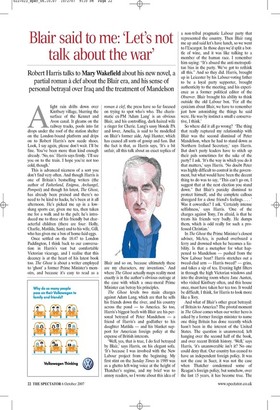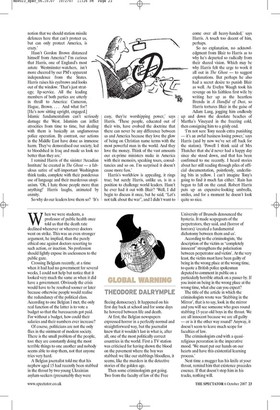Blair said to me: 'Let's not talk about the war'
Robert Harris talks to Mary Wakefield about his new novel, a partial roman a clef about the Blair era, and his sense of personal betrayal over Iraq and the treatment of Mandelson Alight rain drifts down over Kintbury village, blurring the surface of the Kennet and Avon canal. It gleams on the railway tracks, pools into fat drops under the roof of the station shelter on the London-bound platform and drips on to Robert Harris's new suede shoes. Look, I say again, please don't wait. I'll be fine. You've been more than kind enough already. 'No, no.' Harris says firmly. 'I'll see you on to the train. I hope you're not too cold, though.'
This is advanced niceness of a sort you don't find very often. And though Harris is one of Britain's bestselling writers (the author of Fatherland, Enigma, Archangel, Pompeii) and though his latest, The Ghost, has already been praised and there's no need to be kind to hacks, he's been at it all afternoon. He's picked me up in a lowslung sports car, given me tea, then taken me for a walk and to the pub; he's introduced me to three of his friendly but characterful children (there are four: Holly, Charlie, Matilda, Sam) and to his wife, Gill, who has given me a box of home-laid eggs.
Once settled on the 18:47 to London Paddington, I think back to our conversation in Harris's vast but comfortable Victorian vicarage, and I realise that this decency is at the heart of his latest book too. The Ghost is about a writer employed to 'ghost' a former Prime Minister's memoirs, and because it's easy to read as a roman a clef, the press have so far focused on trying to spot who's who. The charismatic ex-PM 'Adam Lang' is an obvious Blair, and his controlling, dark-haired wife a ringer for Cherie. Lang's sassy blonde PA and lover, Amelia, is said to be modelled on Blair's former aide, Anji Hunter, which has caused all sorts of gossip and fuss. But the fact is that, as Harris says, 'It's a bit unfair, all this talk about an exact replica of Blair and so on, because ultimately these are my characters, my inventions.' And where The Ghost actually maps reality most exactly is in the author's obvious outrage at the ease with which a once-moral Prime Minister can betray his principles.
The Ghost levels two main charges against Adam Lang, which are that he sells his friends down the river, and his country across the pond — to America. So too, Harris's biggest beefs with Blair are his personal betrayal of Peter Mandelson — a friend of Harris's and godfather to his daughter Matilda — and his blanket support for American foreign policy at the expense of British interests.
'Well, yes, that is true, I do feel betrayed by Blair,' says Harris, on his elegant sofa. 'It's because I was involved with the New Labour project from the beginning My first stint on the Sunday Times in 1989 was as a ghetto left-wing voice at the height of Thatcher's regime, and my brief was to annoy readers, so I wrote about this idea of a non-tribal pragmatic Labour party that represented the country. Then Blair rang me up and said let's have lunch, so we went to l'Escargot. In those days we'd split a bottle of wine, and it was like talking to a member of the human race. I remember him saying: "It's absurd the anti-metropolitan bias in the party. We've got to rethink all this." And so they did. Harris, brought up in Leicester by his Labour-voting father to be a loyal party supporter, brought authenticity to the meeting, and his experience as a former political editor of the Observer. Blair brought his ability to think outside the old Labour box. Tor all the cynicism about Blair, we have to remember just how astonishing the things he said were. He was by instinct a small c conservative, I think.'
So where did it all go wrong? 'The thing that really ruptured my relationship with Blair was the second dismissal of Peter Mandelson, when he had to stand down as Northern Ireland Secretary,' says Harris. But don't party leaders have to stitch up their pals sometimes for the sake of the party? I ask. 'It's the way in which you do it that matters,' says Harris. 'No doubt Peter was highly difficult to control in the government, but what would have been the decent thing to do was to say, "This can't go on, I suggest that at the next election you stand down." But Blair's panicky dismissal to protect himself, and the complete callous disregard for a close friend's feelings. . . Was it cowardice? I ask. 'Certainly intense selfishness,' says Harris. 'One of the charges against Tony, I'm afraid, is that he treats his friends very badly. He dumps them, which is odd really for such a professed Christian.'
In The Ghost the Prime Minister's closest adviser, McAra, is pushed overboard a ferry and drowned when he becomes a liability. Is that a metaphor for what happened to Mandelson — pushed from the New Labour boat? Harris stretches out a tweed-clad arm — Harris tweed? — grins, and takes a sip of tea. Evening light filters in through the high Victorian windows and into the drawing room where Jane Austen, who visited Kintbury often, and this house once, must have taken her tea too. It would be difficult, I think, for Harris to look more like a Tory.
And what of Blair's other great betrayal: of Britain to America? The pivotal moment in The Ghost comes when our writer hero is asked by a former foreign minister to name one thing Britain has done recently which hasn't been in the interest of the United States. The question is unanswered, left hanging over the second half of the book, and over recent British history. 'Well,' says Harris, 'it's unanswerable isn't it? No one could deny that. Our country has ceased to have an independent foreign policy. It was not the case in Suez, it was not the case when Thatcher condemned some of Reagan's foreign policy, but somehow, over the last 15 years, it has become true. The notion that we should station missile defences here that can't protect us, but can only protect America, is crazy.'
Hasn't Gordon Brown distanced himself from America? I'm curious that Harris, one of England's most astute Westminster-watchers, isn't more cheered by our PM's apparent independence from the States. Harris raises his eyebrows and looks out of the window. 'That's just strategy; lip-service. All the leading members of both parties are utterly in thrall to America: Cameron, Hague, Brown. . . . And what for? [He's now sitting upright, engaged.] Islamic fundamentalism can't seriously damage the West. Islamists can inflict atrocities from time to time, but dealing with them is basically an unglamorous police operation. By contrast, our actions in the Middle East have done us immense harm. They've demoralised our society, led to bloodshed in Iraq and made us look no better than they are.'
I remind Harris of the sinister Arcadian Institute' he created in The Ghost — a fabulous satire of self-important Washington think tanks, complete with their ponderous use of language and their murderous utopianism. 'Oh, I hate those people more than anything!' Harris laughs, animated by enmity.
So why do our leaders love them so? 'It's easy, they're worshipping power,' says Harris. 'These people, educated out of their wits, have evolved the doctrine that there can never be any difference between us and America because they love the glow of being on Christian name terms with the most powerful man in the world. And they love the money Think of the vast amounts our ex-prime ministers make in America with their memoirs, speaking tours, consultancies and so on. I'm surprised it doesn't cause more fuss.'
Harris's worldview is appealing, it rings true; but surely Harris, unlike us, is in a position to challenge world leaders. Hasn't he ever had it out with Blair? 'Well, I did begin to discuss it once, but he said, "Let's not talk about the war", and I didn't want to come over all heavy-handed,' says Harris. A touch too decent of him, perhaps.
So no explanation, no acknowledgment from Blair to Harris as to why he's departed so radically from their shared vision. Which may be why Harris felt the urge to work it all out in The Ghost — to suggest explanations. But perhaps he also had a secret desire to punish Blair as well. As Evelyn Waugh took his revenge on his faithless first wife by writing her up as the heartless Brenda in A Handful of Dust, so Harris tortures Blair in the guise of Adam Lang, jogging him endlessly up and down the desolate beaches of Martha's Vineyard in the freezing cold, then consigning him to a grisly end.
'I'm not sure Tony needs extra punishing — it's an awful business losing power,' says Harris (and by now we've set off back for the station). 'Powell I think said of Mrs Thatcher that she'd never had a happy day since she stood down, and that has been confirmed to me recently. I heard stories about her still reading through piles of official documentation, pointlessly, underlining bits in yellow. I can't imagine Tony's going to find it much fun either.' Rain has begun to fall on the canal. Robert Harris puts up an expensive-looking umbrella, smiles, and for a moment he doesn't look quite so nice.






























































 Previous page
Previous page